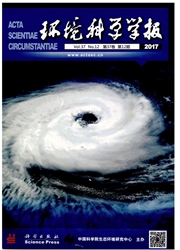

 中文摘要:
中文摘要:
过去20年中,基因组学的研究成果未能对疾病发生原因提供本质的认识,人们较早意识到环境因素对于人体健康的重要性.早期对于人体暴露的研究主要集中在内外暴露的研究,未综合考虑人体总的环境暴露.自暴露组(exposome)概念提出以来,得到了广泛关注,也使暴露科学的内涵和外延得到了延伸.暴露组是指一个人从出生至生命结束全过程各种暴露的总和,真正意义上探讨污染暴露、人体健康和疾病发生的实在本质,包括了外暴露、内暴露和社会暴露.研究方法上结合了基于生物监测的"自上向下"法和基于监测空气、水和食物等"自下向上"法,而在研究手段上涉及了环境科学的外暴露和基因组学的分子生物学等中广泛应用的研究技术.然而当前准确测量暴露组仍然是一个巨大的挑战,只有多学科技术手段和研究方法发展和融合才能更好地促进暴露组研究的进步.我国暴露科学研究起步较晚,目前学者对于暴露组的研究仍然薄弱,本文主要从暴露组的概念、研究方法以及测量技术手段入手,介绍这一新兴的研究科学.
 英文摘要:
英文摘要:
Over the past two decades, the research outcomes in sequencing the human genome have revealed very little about the underlying causes of human diseases. This failure seems to imply that genetic variability is not the major cause of human diseases. As a result, environmental factors are now considered as major contributors to human health. Environmental exposure was defined previously by contact with agents from external sources(such as air, water, diet, infection, radiation, and stress) or internal sources( such as hormones, inflammation, and pre-existing health conditions) without consideration of the total exposure during an organism′s lifetime. Ever since the concept of " exposome", which refers to the totality of environmental exposures received during an organism′s life, was proposed, a comprehensive understanding of the complex interplay between the genome, the epigenome,and the environment has been developing. However, it is still a big challenge to accurately quantify the individual exposome. Unquestionably, coherent development of multidisciplinary approaches and analytical techniques will facilitate the study of exposome. In China, studies of the organism exposome are still very limited. This review paper is mainly focusing on the concept, research approaches, and measurement tools used in studying the human exposome.
 同期刊论文项目
同期刊论文项目
 同项目期刊论文
同项目期刊论文
 期刊信息
期刊信息
